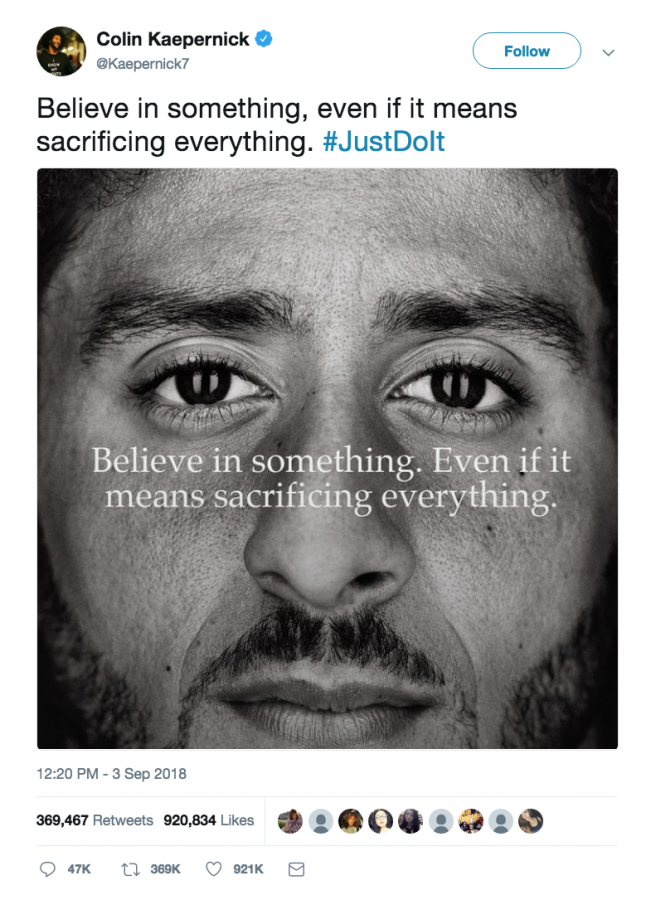Kaepernick
The Take a Knee movement in 2018
When I suggested that we cover Take a Knee for the third year in a row in our September issue, our advisor and editorial staff alike questioned if it was worth it. Would this controversy, which first began several years ago, still be relevant in 2018? My answer then, and my answer still now, with Colin Kaepernick announced as a face of Nike’s Just Do It campaign earlier this month, was yes.
Yes, because the debates revolving around American citizens’ constitutional rights will always be valid in this country. And, though gun control has perhaps become a more prominently discussed issue in the past year in this nation than ever before, police brutality and the Black Lives Matter movement have begun to be once again swept under the rug by the media. These are two issues which are inseparably connected to conversations regarding gun control and other acts of violence, yet have been covered as separate issues, and often not covered at all.
These are the very issues that Kaepernick’s initial protest of kneeling during the playing of the national anthem was rooted in. While this year has certainly been a tumultuous one for the news, the lack of coverage of police brutality is noteworthy. While incidents are reported in a way that would imply isolation, the trend of harsh and violent treatment of black Americans by police officers in America is still ongoing. Just earlier this month, a black man was fatally shot by a white policewoman in his own apartment that she had mistaken for her own.
In tandem with this, Kaepernick remains an unsigned free agent and has filed a lawsuit against the NFL for colluding against him to prevent him from being signed. Many teams simply do not want to have to deal with the controversy and potential fallout that comes with having such a polarizing figure on their roster.
Yet, in a striking move, Nike, the company that supplies uniforms for the NFL, has made Kaepernick a face of their Just Do It campaign, releasing advertisements with a black and white photo of him and the words, “Believe in something. Even if it means sacrificing everything.” In a two-minute-long ad aired during the NFL season opener, he voices over clips of athletes who have overcome certain odds to achieve greatness. It ends with the words, “Don’t ask if your dreams are crazy. Ask if they’re crazy enough.”
With the controversy that has once again exploded from Kaepernick’s new ad, it is important to remember what he was protesting in the first place. It is rather telling about the nature of what issues Americans are willing to address head on that an ad campaign from a shoe company has generated more controversy in the past month than the shooting of an unarmed black man in his own home.
It is necessary to understand the roots of why this movement has become so controversial, and to understand that fury at Kaepernick in this nation comes perhaps more from the inability of Americans to accept and address the wrongs being committed against minorities than it does discussions over what is appropriate to do during the playing of a song before a sports match.

Johana Ligtenberg is a current senior and member of the Titan class of 2019. As the Editor-in-Chief, Johana Ligtenberg oversees all department editors...








